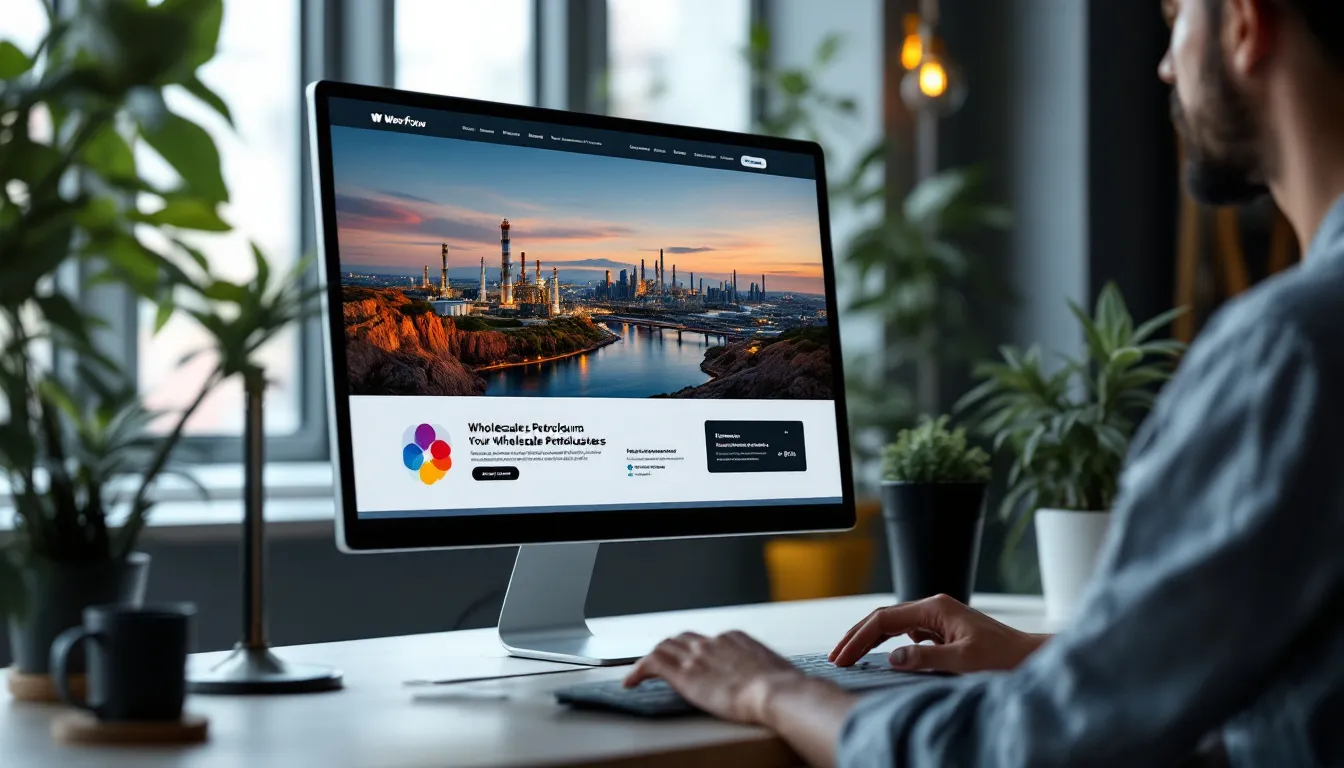See How I Helped My Client Achieve Better Results
A real-life case study of a website redesign on CMS — optimized for growth, easy content management, and stronger SEO performance.
- Custom Design That Reflects Your Brand Unlike cookie-cutter templates, Webflow offers full creative freedom. I design websites tailored to your specific goals, ensuring a professional look that resonates with your audience.
- Clean, SEO-Friendly StructureWebflow’s built-in SEO capabilities allow me to create a well-structured website with:
- Clean, keyword-rich URLs for better search visibility.
- Logical internal linking to boost user navigation and page authority.
- Schema markup integration for enhanced search engine understanding.
- Responsive by DesignYour audience is using desktops, tablets, and smartphones. Every site I build is optimized for all screen sizes, ensuring a seamless experience no matter how visitors access it.
- CMS That Puts You in ControlWith Webflow’s powerful CMS, you can easily manage and update your content, from blog posts to product descriptions, without needing technical expertise.
How to Build a Website in Webflow for a Wholesale Import and Export Company with CMS: A Guide for Webflow Designers
In the fast-paced world of wholesale import and export, having a robust online presence is crucial. A well-designed website not only showcases products but also serves as a vital communication tool between businesses and their clients. Webflow, with its powerful CMS capabilities, offers an excellent platform for creating such websites. This guide will walk you through the process of building a website in Webflow specifically tailored for a wholesale import and export company.
Understanding the Needs of a Wholesale Import and Export Company
Before diving into the technical aspects of Webflow, it's essential to understand the unique requirements of a wholesale import and export business. These companies often deal with a vast array of products, multiple suppliers, and a diverse customer base. Therefore, the website must be designed to accommodate these complexities. The ability to manage large inventories and provide real-time updates on product availability can significantly enhance the user experience, making it easier for clients to make informed purchasing decisions.

Moreover, as the global market continues to evolve, wholesale companies must also consider the implications of international trade regulations and logistics. This means that the website should not only showcase products but also include resources that educate clients about shipping options, customs requirements, and potential tariffs. By providing this valuable information, businesses can position themselves as knowledgeable partners in the import and export process, thereby fostering stronger relationships with their clients.
Key Features to Consider
When designing a website for a wholesale company, several key features should be prioritized:
- Product Catalog: A comprehensive and easily navigable product catalog is essential. This allows potential clients to browse through various products effortlessly. Additionally, incorporating advanced search filters and sorting options can help users quickly find what they are looking for, enhancing their overall experience.
- Supplier Information: Providing detailed information about suppliers can help establish credibility and trust with clients. Including testimonials, case studies, or even videos that highlight successful partnerships can further reinforce this trust and encourage potential clients to engage.
- Contact Forms: Easy-to-use contact forms are vital for facilitating communication between the business and its clients. Implementing features such as live chat support can also provide immediate assistance, ensuring that inquiries are addressed promptly.
Target Audience
Understanding the target audience is crucial for effective design. Wholesale companies typically cater to retailers, distributors, and other businesses. Therefore, the website should reflect a professional tone while also being user-friendly. This balance is key to engaging potential clients and driving conversions. Additionally, it’s important to recognize the varying levels of tech-savviness among users; thus, the design should cater to both seasoned professionals and those who may be less familiar with online purchasing processes.
Furthermore, incorporating educational content such as blog posts, industry news, and how-to guides can attract and retain visitors. By addressing common pain points and offering solutions, wholesale companies can position themselves as thought leaders in their industry. This not only helps in building brand loyalty but also encourages repeat visits, as clients will see the website as a valuable resource for their business needs.
Setting Up Your Webflow Project
Once the needs and features are identified, the next step is to set up your Webflow project. This process involves creating a new project and configuring the basic settings to align with the company’s branding.

Creating a New Project
To start, log into your Webflow account and create a new project. Choose a blank canvas or a template that resonates with the wholesale import and export theme. Templates can save time, but customizing a blank canvas allows for more flexibility in design.
Branding and Design Elements
Branding is a critical aspect of any website. It’s important to incorporate the company’s logo, color palette, and typography into the design. This not only enhances brand recognition but also creates a cohesive look throughout the site.
Consider the use of high-quality images that showcase products effectively. Visual elements play a significant role in attracting and retaining visitors. Ensure that images are optimized for web use to maintain fast loading times.
Building the Structure of the Website
The structure of the website should be intuitive and user-friendly. A well-organized layout ensures that visitors can easily find the information they need.
Creating Navigation Menus
Navigation is one of the most critical aspects of website design. A clear and concise navigation menu allows users to explore different sections of the site without confusion. Consider including the following items in the main navigation:
- Home
- Products
- Suppliers
- About Us
- Contact
Dropdown menus can also be beneficial for categorizing products or suppliers, making it easier for users to find specific items.
Utilizing Webflow’s CMS
Webflow’s CMS (Content Management System) is a powerful tool that allows for dynamic content management. For a wholesale import and export company, the CMS can be used to manage products, suppliers, and blog posts.
To set up the CMS, create collections for products and suppliers. Each collection can have custom fields such as product name, description, price, and images. This setup makes it easy to add, edit, or remove items without needing to dive into the design every time.
Designing Product Pages
Product pages are the heart of any wholesale website. They need to be informative, visually appealing, and easy to navigate.
Essential Elements of Product Pages
Each product page should include:
- High-Quality Images: Multiple images from different angles can help customers get a better understanding of the product.
- Detailed Descriptions: Clear and concise descriptions that highlight features and benefits are essential.
- Pricing Information: Display pricing clearly, and consider including bulk pricing options if applicable.
Call-to-Action (CTA)
Every product page should have a strong call-to-action. Whether it’s a button to request a quote, add to cart, or contact for more information, a well-placed CTA can significantly enhance conversion rates.
Enhancing User Experience (UX)
User experience is paramount in web design. A website that is easy to navigate and visually appealing will keep visitors engaged and encourage them to return.
Responsive Design
With an increasing number of users accessing websites via mobile devices, ensuring that your site is responsive is crucial. Webflow makes it easy to create a responsive design that adapts to different screen sizes. Test the website on various devices to ensure a seamless experience for all users.
Loading Speed Optimization
Website loading speed can significantly impact user experience and SEO. Optimize images, minimize code, and leverage browser caching to improve loading times. Webflow provides built-in tools to help with these optimizations, making it easier to achieve a fast-loading website.
Search Engine Optimization (SEO)
SEO is vital for ensuring that the website ranks well in search engine results. A well-optimized site will attract more organic traffic, which is essential for any wholesale business.
On-Page SEO Techniques
Implementing on-page SEO techniques is crucial for improving visibility. Here are some key strategies:
- Keyword Research: Identify relevant keywords that potential clients may use to search for products. Incorporate these keywords naturally into product descriptions, headings, and meta tags.
- Meta Tags: Ensure that each page has unique meta titles and descriptions that accurately reflect the content. This helps search engines understand the page’s purpose and improves click-through rates.
- Alt Text for Images: Use descriptive alt text for all images. This not only helps with SEO but also improves accessibility for visually impaired users.
Building Backlinks
Building backlinks from reputable sources can significantly enhance the website’s authority. Consider reaching out to industry blogs, suppliers, and partners for guest posting opportunities or collaborations that can lead to backlinks.
Conversion Rate Optimization (CRO)
Once the website is live, the focus should shift to conversion rate optimization. This involves analyzing user behavior and making necessary adjustments to improve the likelihood of conversions.
Analyzing User Behavior
Utilize tools like Google Analytics to track user behavior on the website. Pay attention to metrics such as bounce rate, average session duration, and conversion rates. These insights can help identify areas for improvement.
A/B Testing
A/B testing is a powerful method for optimizing conversions. Test different versions of landing pages, CTAs, and product descriptions to see which performs better. Small changes can often lead to significant improvements in conversion rates.
Maintaining the Website
Building a website is just the beginning. Regular maintenance is essential to ensure that the site remains functional and up-to-date.
Regular Updates
Keep the product catalog updated with the latest offerings. Regularly review and refresh content to keep it relevant and engaging. This not only helps with SEO but also keeps returning visitors interested.
Monitoring Performance
Continuously monitor the website’s performance using analytics tools. Look for trends and make adjustments based on user feedback and behavior. This proactive approach can help maintain a high-quality user experience.
Conclusion
Building a website in Webflow for a wholesale import and export company is a rewarding endeavor. By understanding the unique needs of the business, utilizing Webflow’s powerful features, and focusing on UX, SEO, and CRO, designers can create a site that not only attracts visitors but also converts them into loyal customers.

With careful planning and execution, the website can become a valuable asset for the business, driving growth and establishing a strong online presence in the competitive wholesale market.
Ready to Elevate Your Online Presence?
If you're inspired to take your wholesale import and export business to the next level with a high-performance, SEO-optimized Webflow website, look no further. I am Karina Slizova, a dedicated Freelance Web Designer and Webflow Developer with a track record of crafting tailored no-code website solutions for various industries. My commitment is to transform your website into a client-converting powerhouse. Schedule a call with me today, and let's collaborate to achieve your business goals with a website that stands out in the digital marketplace.

👋 I'm Karina Slizova — a Webflow designer and developer specializing in websites for construction, agriculture, real estate, and architecture companies.
If you're looking to build a website like this and hire a Webflow designer — let's talk.







